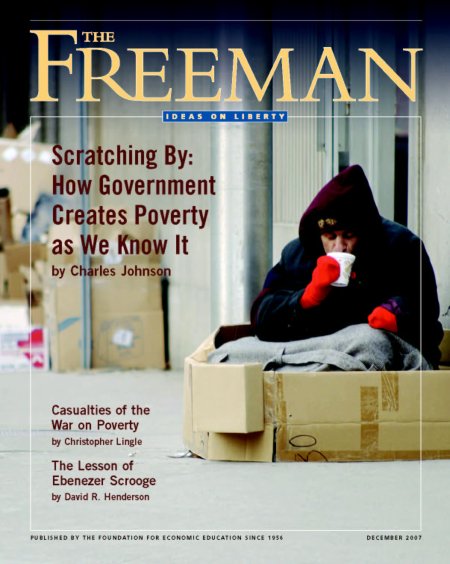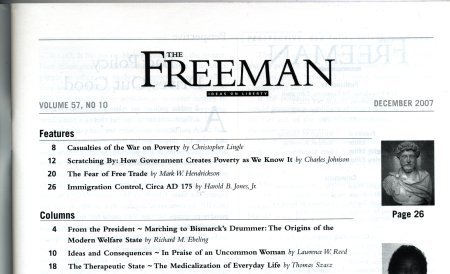Scratching By: How Government Creates Poverty as We Know It
Here's a pretty old post from the blog archives of Geekery Today; it was written about 17 years ago, in 2008, on the World Wide Web.
Here’s something I found in the mail yesterday:
Scratching By: How Government Creates Poverty as We Know It
Governments—local, state, and federal—spend a lot of time wringing their hands about the plight of the urban poor. Look around any government agency and you'll never fail to find some know-it-all with a suit and a nameplate on his desk who has just the right government program to eliminate or ameliorate, or at least contain, the worst aspects of grinding poverty in American cities—especially as experienced by black people, immigrants, people with disabilities, and everyone else marked for the special observation and solicitude of the state bureaucracy. Depending on the bureaucrat's frame of mind, his pet programs might focus on doling out conditional charity to
deservingpoor people, or putting moreat-riskpoor people under the surveillance of social workers and medical experts, or beating up recalcitrant poor people and locking them in cages for several years.But the one thing that the government and its managerial aid workers will never do is just get out of the way and let poor people do the things that poor people naturally do, and always have done, to scratch by.
Government anti-poverty programs are a classic case of the therapeutic state setting out to treat disorders created by the state itself. Urban poverty as we know it is, in fact, exclusively a creature of state intervention in consensual economic dealings. This claim may seem bold, even to most libertarians. But a lot turns on the phrase "as we know it." Even if absolute laissez faire reigned beginning tomorrow, there would still be people in big cities who are living paycheck to paycheck, heavily in debt, homeless, jobless, or otherwise at the bottom rungs of the socioeconomic ladder. These conditions may be persistent social problems, and it may be that free people in a free society will still have to come up with voluntary institutions and practices for addressing them. But in the state-regimented market that dominates today, the material predicament that poor people find themselves in—and the arrangements they must make within that predicament—are battered into their familiar shape, as if by an invisible fist, through the diffuse effects of pervasive, interlocking interventions ….
— Scratching By: How Government Creates Poverty as We Know It,
In The Freeman (December 2007), 12–17.
You can read the whole thing at The Freeman‘s website. Enjoy! FEE’s website doesn’t (yet) support online comments, but I’d be glad to hear what you think in the comments section over here.
While I’m on the subject, I’d like especially to thank Sheldon Richman for his encouragement and his help, and my companion L. for her patient reading and helpful comments. The article would have been much the poorer, or more likely nonexistent, without their aid.


Great article! Digg it here.
Holy shit, you rock!
Bravo! Charles. This is a fine article. I hope to see more like it in the future.
I think the most important insight is, “Rather than freeing poor people from dependence on benefactors and bosses, [the welfare state] merely transfers the dependence to the state, leaving the least politically connected people at the mercy of the political process.”
The idea that the state is compassionate while the others are exploiters is the main reason why support of the welfare state persists.
As a long-time anti-poverty activist, I feel it’s worth noting I have some reservations about simply dismantling the welfare state (or what’s left of it) without a clear way forward. I feel like a lot of welfare-type programs could be taken over by poor people and transformed into more mutual aid-based programs.
All in all I really appreciated the overall thrust of your article. Experience in anti-poverty activism has shown me that you’re very right that the basic strategies poor people use to get by are the most important part of ending poverty.
I’d really love to see more on the topic from you. Thanks for the great article.
It’s a good article, but I’d say that more work needs to be done on demonstrating that unlicensed taxi cabs and self-built shacks are not a “bad thing”. Like you say, poverty can be tough but it doesn’t have to be quite so hopeless.
In the current situation, I don’t think welfare payments are such a bad thing, in the current environment, but the conditions attached are the real problem.
I would think that if the welfare state simply stopped at the point of redistributing some income, the results might be much better.
What I hate to see are poor people who have no motivation to try and do anything for themselves. They won’t take money and find somewhere to live, find a job and so on, they’ll wait around to be given government housing and for someone to push them towards employment. It’s really rather tragic that people have effectively been “broken” by service dependence.
Well, back on track, I think there needs to be continued debunking of anti-poverty programs, but also continuing attacks on the assumption that “unregulated” means “unsafe”. It’s a very difficult thing to shift from people’s minds when they don’t understand the real nature of the corporate state.
Good work!
Keep defending freedom! Drop me a line any time!
One night I waited over 2 hours for an expensive lift from a taxi driver whose license cost him hundreds of thousands of dollars. That prompted me to consider for the first time how crazy state-imposed barriers to market entry can be and how they specifically hurt the poor. I think it’s a great example to use, particularly because it’s obvious that unlicensed cabs are not a “bad thing”. The obscene cost of licenses puts the lie to the claim that they function to ensure the safety of clients (I can’t think of any other non-predatory justification for licensing), rather than the protection of established cartels.
Discussed at radgeek.com /#
Rad Geek People’s Daily 2008-01-18 – Fryeday quote:
I agree with the thesis of your article in The Freeman. Our New Communities Initiative (FightBlight program) here in Wichita, Kansas actually victimizes the people that it is intended to help. These are the people who are least likely able to defend themselves from the hand of government. The program actually winds up destroying more “affordable housing” units than it creates. And it actually reduces people’s potential of obtaining the American Dream of home ownership by placing them in government or quasi-government owned public housing rental units with the actual result of leaving people ready to retire with a handful rental receipts in lieu of home ownership.